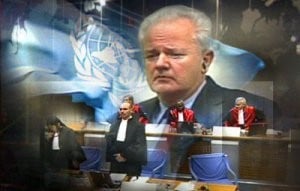The Truth behind the Death of Slobodan Milosevic

Published ten years ago by Global Research
STATEMENT OF TIPHAINE DICKSON, LEGAL SPOKESPERSON OF THE INTERNATIONAL COMMITTEE TO DEFEND SLOBODAN MILOSEVIC, AT THE ICDSM PRESS CONFERENCE HELD AT THE BELAIR TULIP IN THE HAGUE, NETHERLANDS, MARCH 14th, 2006.
Tiphaine Dickson
This press conference was initially planned last week, to present a request signed by well-known jurists, including the former Attorney General of the United States, Mr. Ramsey Clark, and prominent political figures, including a member of the Russian Duma, the Czech Parliament as well as the European Parliament, which was filed last Friday with the Security Council of the United Nations as well as the Appeals Chamber of the ICTY, to direct the latter institution to permit President Milosevic to receive the specialized medical treatment his well-known and longstanding medical condition required at the Bakoulev Center in Moscow.
It obviously pains me to have made this last trip to The Hague without any hope that Slobodan Milosevic’s health will ever be stabilized.
What an indecent end to a disgraceful process, starting on day one, when in a blaze of astonishing irony, the president of Yugoslavia was indicted by this body for allegations of crimes against Humanity in Kosovo, a claim backed by evidence so slender and biased that it was inversely proportional to its political and indeed its military charge.
The bombing itself—all 78 days of it—was executed in violation of international law, a classic case of aggression, held by the Nuremberg Tribunal to be the supreme international crime in that it holds within it the accumulated evil of all other war crimes.
That the NATO bombing was a violation of international law was acknowledged by Wesley Clark, to the US weekly The New Yorker, but that admission was deemed inadmissible before this Security Council institution, the ICTY. Mr Milosevic was prevented from raising General Clark’s candid admission before this body, although it was so obviously germane to his defense.
NATO short-circuited the Security Council to bomb, yet instrumentalized a Security Council body to indict President Milosevic and kept bombing, as the Prosecutor announced that because of the indictment of the President of the country being bombed in violation of international law, the president, the reprentative of his people, was no longer a suitable guarantor in any peace negotiations.
Disgraceful from the start.
And so it went, with President Milosevic’s removal from then Yugoslavia, without as much as a court order to the director of the Belgrade jail in which he was being held, and in violation of a decision by Yugoslavia’s constitutional court.
And it ground on, with every single request for provisional release, based on his ill-health, denied.
Was the presumption that President Milosevic would abscond? Such a conclusion is preposterous, as in four years, he made clear his tireless commitment to defending himself, and above all he demonstrated his unrelenting passion for setting out the facts about the dismemberment of Yugoslavia.
His commitment to presenting his case, that there were no Balkan wars but indeed one war, waged against Yugoslavia, was evident for all to observe.
This was most obvious when President Milosevic was poised to begin his defense in late August 2004. His health was better than it became in recent months, yet, incredibly, Dr. Falke, the ICTY prison doctor, reported that Slobodan Milosevic would not have the ability to represent himself in the proceedings against him.
Contrast this finding—a matter of law, which in any event, a medical practitioner is not entitled to determine—with the trial Chamber’s subsequent findings questioning the necessity of specialized medical care in Moscow.
Contradictory positions with a common thread: the violation of the rights of an accused person.
That Pavle Strugar, accused before the ICTY, may receive hip replacement surgery—a minor procedure—based on the guarantees of Montenegro, seems absurdly inconsistent with the denial of complex vascular and cardiac care in a renowned specialized facility in Russia, a permanent member of the Security Council.
I can tell you that President Milosevic was hoping that our letter to the Security Council and to the Trial Chamber would be persuasive, and that this press conference could help him receive treatment so that he could finish his defense without fear of a hypertensive crisis or constant ringing in his ears.
But that is not to be.
Our hope is that the confidentiality of all medical records, doctors’ notes, prescription protocols and records, as well as test results be waived and be available for scrutiny and for discussion, without exception.
We will shortly be requesting that the Secretary-General of the UN, Kofi Annan, waive the civil and criminal immunity of certain individuals who by systematic neglect, potential medical malpractice, or worse, precipitated the death of a man, who even in death, stands wrongfully accused of having been its cause.
We hope, and are fully confident, that the truth will emerge.

